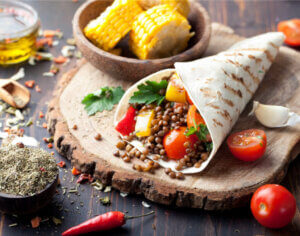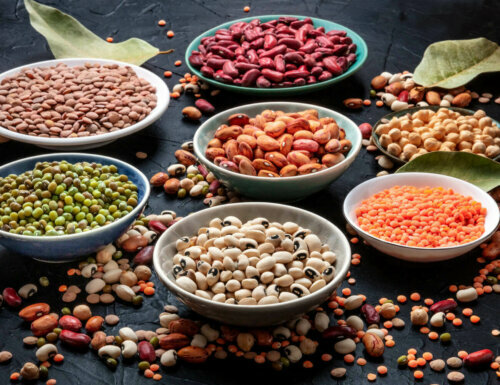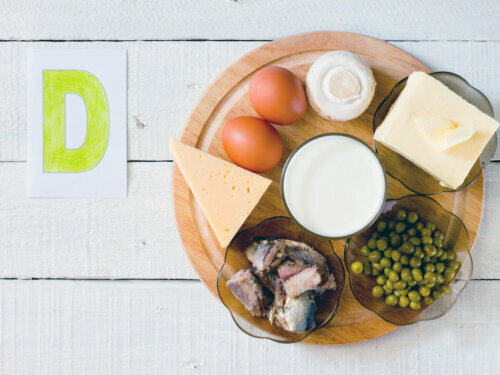What to Eat if You're a Vegan Athlete

The vegan athlete must take into account a series of considerations regarding their diet in order to reduce the risk of nutrient deficiencies. The vegan diet is restrictive, and the fact that it excludes certain products can affect the proper contribution of essential micro and macronutrients.
In this article, we’ll show you what factors you have to take into account to follow this type of diet as an athlete, so that you can avoid affecting your health and performance. It’s possible to be a vegan and an athlete. Don’t miss it!
Protein intake in the vegan athlete’s diet
One of the nutrients that can be missing from a vegan diet is protein. Although this substance has a high biological value when it comes from animals, it loses quality when you get it from plant foods.
The protein you can find in these products is deficient in essential amino acids. Some of them are especially important when it comes to muscle reconstruction and sports recovery, as is the case with leucine. This is indicated by research published in The American Journal of Clinical Nutrition.
Proteins are also necessary to generate muscle hypertrophy, important in many sports disciplines. To guarantee the proper supply of these nutrients in a vegan diet, we recommend you increase its intake compared to a diet that includes meat.
Therefore, it’s best if your daily protein intake exceeds 1.3 grams per kilo of body weight, per day. Additionally, you need to get these nutrients through different plant foods, to avoid deficiencies in essential amino acids.

Within a vegan diet, you should eat legumes, nuts, seeds, and pseudo-cereals often. On many occasions, you can also consider protein supplements to complete this contribution.
Vitamin B12 and iron for the vegan athlete
Vitamin B12 and iron are two commonly deficient nutrients in vegan diets. People who practice certain sports, such as long-distance running, need even more of these substances.
Runners are often prone to developing a well-known runner’s anemia. This condition occurs due to the rupture of red blood cells near the Achilles tendon from successive impacts against the ground.
To prevent this disorder you need to increase your iron and vitamin B12 intake. According to research published in the Clinical Journal of Sports Medicine, elite triathletes and runners have higher mineral needs.
To cover the minimum vitamin B12 needs in the diet of a vegan athlete, you’ll need to resort to supplementation, since it’s a nutrient that you can’t find in the plant kingdom.
You can get iron through your diet, but you have to choose foods with a high content of this mineral and combine their intake with fruits and vegetables with a good amount of vitamin C. This vitamin is capable of enhancing the absorption of iron from foods, whose bioavailability is lower in the plant kingdom than in the animal kingdom.
The importance of vitamin D
Another nutrient to watch out for in a vegan athlete’s diet is vitamin D. You can get this substance through exposure to sunlight or through your diet.
You can find it mostly in fatty fish, eggs, and enriched dairy products. Plant products are usually lacking in this vitamin, which determines their dietary intake.

In the event that you’re not frequently exposed to the sun, you’ll have to assess supplementation with this vitamin. Otherwise, your performance and health in the medium and long term could be compromised. A vitamin D deficit is associated with an increased risk of developing complex diseases.
Adjusting your diet if you’re a vegan athlete
It’s possible to be an athlete and vegan without limiting athletic performance. However, you do need to respect the dietary recommendations we mentioned to avoid deficiencies. Not getting enough nutrients will affect your efficiency and health in the medium and long term.
If your diet isn’t capable of providing all the substances that your body needs, due to its restrictive nature, you’ll need to resort to supplements. You should consult with a nutritionist to plan an adequate and safe diet based on your needs.
The vegan athlete must take into account a series of considerations regarding their diet in order to reduce the risk of nutrient deficiencies. The vegan diet is restrictive, and the fact that it excludes certain products can affect the proper contribution of essential micro and macronutrients.
In this article, we’ll show you what factors you have to take into account to follow this type of diet as an athlete, so that you can avoid affecting your health and performance. It’s possible to be a vegan and an athlete. Don’t miss it!
Protein intake in the vegan athlete’s diet
One of the nutrients that can be missing from a vegan diet is protein. Although this substance has a high biological value when it comes from animals, it loses quality when you get it from plant foods.
The protein you can find in these products is deficient in essential amino acids. Some of them are especially important when it comes to muscle reconstruction and sports recovery, as is the case with leucine. This is indicated by research published in The American Journal of Clinical Nutrition.
Proteins are also necessary to generate muscle hypertrophy, important in many sports disciplines. To guarantee the proper supply of these nutrients in a vegan diet, we recommend you increase its intake compared to a diet that includes meat.
Therefore, it’s best if your daily protein intake exceeds 1.3 grams per kilo of body weight, per day. Additionally, you need to get these nutrients through different plant foods, to avoid deficiencies in essential amino acids.

Within a vegan diet, you should eat legumes, nuts, seeds, and pseudo-cereals often. On many occasions, you can also consider protein supplements to complete this contribution.
Vitamin B12 and iron for the vegan athlete
Vitamin B12 and iron are two commonly deficient nutrients in vegan diets. People who practice certain sports, such as long-distance running, need even more of these substances.
Runners are often prone to developing a well-known runner’s anemia. This condition occurs due to the rupture of red blood cells near the Achilles tendon from successive impacts against the ground.
To prevent this disorder you need to increase your iron and vitamin B12 intake. According to research published in the Clinical Journal of Sports Medicine, elite triathletes and runners have higher mineral needs.
To cover the minimum vitamin B12 needs in the diet of a vegan athlete, you’ll need to resort to supplementation, since it’s a nutrient that you can’t find in the plant kingdom.
You can get iron through your diet, but you have to choose foods with a high content of this mineral and combine their intake with fruits and vegetables with a good amount of vitamin C. This vitamin is capable of enhancing the absorption of iron from foods, whose bioavailability is lower in the plant kingdom than in the animal kingdom.
The importance of vitamin D
Another nutrient to watch out for in a vegan athlete’s diet is vitamin D. You can get this substance through exposure to sunlight or through your diet.
You can find it mostly in fatty fish, eggs, and enriched dairy products. Plant products are usually lacking in this vitamin, which determines their dietary intake.

In the event that you’re not frequently exposed to the sun, you’ll have to assess supplementation with this vitamin. Otherwise, your performance and health in the medium and long term could be compromised. A vitamin D deficit is associated with an increased risk of developing complex diseases.
Adjusting your diet if you’re a vegan athlete
It’s possible to be an athlete and vegan without limiting athletic performance. However, you do need to respect the dietary recommendations we mentioned to avoid deficiencies. Not getting enough nutrients will affect your efficiency and health in the medium and long term.
If your diet isn’t capable of providing all the substances that your body needs, due to its restrictive nature, you’ll need to resort to supplements. You should consult with a nutritionist to plan an adequate and safe diet based on your needs.
All cited sources were thoroughly reviewed by our team to ensure their quality, reliability, currency, and validity. The bibliography of this article was considered reliable and of academic or scientific accuracy.
- English KL., Mettler JA., Ellison JB., Mamerow MM., et al., Leucine partially protects muscle mass and function during bed rest in middle aged adults. Am J Clin Nutr, 2016. 103 (2): 465-73.
- Coates A., Mountjoy M., Burr J., Incidence of iron deficiency and iron deficient anemia in elite runners and triathletes. Clin J Sport Med, 2017. 27 (5): 493-498.
This text is provided for informational purposes only and does not replace consultation with a professional. If in doubt, consult your specialist.








